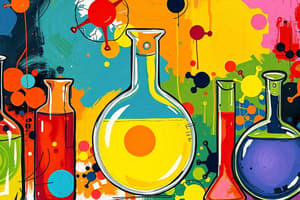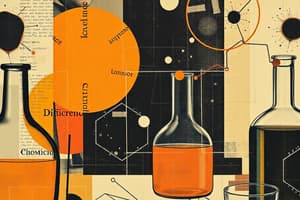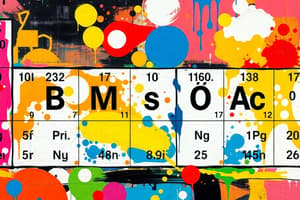Podcast
Questions and Answers
Pure substances can only consist of a single element, not a compound.
Pure substances can only consist of a single element, not a compound.
False (B)
Mixtures can be separated by physical means.
Mixtures can be separated by physical means.
True (A)
A beaker of pure water contains only H2O molecules and nothing else.
A beaker of pure water contains only H2O molecules and nothing else.
True (A)
Air is considered a pure substance.
Air is considered a pure substance.
Before 1669, the discovery of elements included gold, silver, and mercury.
Before 1669, the discovery of elements included gold, silver, and mercury.
Flashcards are hidden until you start studying
Study Notes
Chemistry: Elements, Compounds, and Mixtures
-
In chemistry, pure substances can consist of a single element or compound with no other substances added.
-
A beaker of pure water contains only H2O molecules and nothing else.
-
When salt is added to the water, a mixture is produced, as it contains two or more elements or compounds physically mixed together.
-
Mixtures do not involve chemical combinations, and the chemical properties of the substances in a mixture remain unchanged.
-
Substances in mixtures can be separated by physical means.
-
Air is an example of a mixture, consisting of nitrogen, oxygen, and other gases like carbon dioxide and argon.
-
Before 1669, elements such as carbon, sulfur, iron, copper, arsenic, silver, tin, antimony, gold, and mercury were discovered.
-
The concept of an atom being indivisible is essential in understanding elements, compounds, and mixtures.
-
Visual representations can help in understanding these concepts.
-
The term "pure" has different meanings in everyday language and in chemistry.
-
Pure substances may consist of a single element or compound with no other substances added.
-
Mixtures consist of two or more elements or compounds physically mixed together, without chemical combination.
-
Air is an example of a mixture, containing nitrogen, oxygen, and other gases.
-
Before 1669, several elements were discovered, including carbon, sulfur, iron, copper, arsenic, silver, tin, antimony, gold, and mercury.
Studying That Suits You
Use AI to generate personalized quizzes and flashcards to suit your learning preferences.





